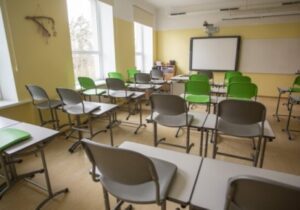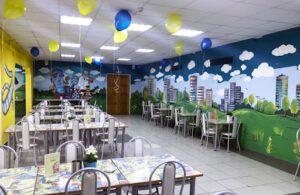
Winter vacations in the capital’s schools will start on schedule, from December 26, 2022, Kiev Mayor Vitaly Klitschko said.
“But will last a month – until January 27, 2023. During this time, schools will be heated in minimum mode to support the heating system. Teachers, if desired, can go on paid leave for the duration of the vacations,” Klitschko wrote in his Telegram channel.
He noted that in case of emergency, part of the schools in the city will be used for the work of heating points.
The school year will last in the capital’s schools until July 1 – according to the law.

Yesterday a new academic year began in Ukrainian schools. At the same time, due to the realities of martial law, the organization of the educational process in different regions differs significantly. Territorial became the determining criterion for choosing the form of education this year. According to Minister of Education Sergei Shkarlet, students are divided into categories depending on their place of residence at the start of the school year. Depending on this, the forms of education can be selected: full-time, distance, mixed, family, or external studies.

In Kyiv, most schools will continue to use the traditional full-time form of education. According to the KMDA, about 68% of schools in the capital are equipped with shelters, the capacity of which will directly affect the number of students in the classes. This should be determined by a special commission. At the same time, according to the survey, about 70% of parents of Kyiv students choose the full-time form of education for their children.
Oksana Poenko, the founder and director of the Mainstream school in the capital, believes that the choice of the form of education in the current conditions should be individual.
“Now the safety of the child is of decisive importance, depending on this, the format of education can be different. If the school is equipped with a reliable shelter, then it can be even a safer place than a residential building where such shelter may not be,” she said.

According to Oksana Poenko, one should not forget about the traditional advantages and disadvantages of distance or face-to-face education.
“The best option for learning, in my opinion, is now a mixed form, when individual subjects can be taught remotely. The specifics of the course itself are of great importance. Some disciplines are much better perceived by students through the full-time form. We have implemented several concepts at our school as full-time, For example, there are specialized classes for older students, as well as an online school for distance education,” Poenko stressed.
In her opinion, the initiative of the Ministry of Education to reduce the number of students in classes and introduce two-shift education is correct not only for security reasons but also from a purely pedagogical point of view.
“Since 2016, the Mainstream School has been using a methodology to create a special social environment for students, when their individuality is maximally supported. It is optimal for a teacher to maintain communication with no more than 10 students during a lesson. Yes, there are state standards that say about 25-30 students, but, in my opinion, this is an outdated practice that should be abandoned long ago. In such a class, the teacher simply does not have time to pay enough attention to everyone, and this is very important for the development of the child’s individuality,” Poenko said.

The Mainstream School was founded in October 2016. The purpose of creating an educational institution was the need for quality education for children. The school appeared as an alternative to the state one, and over the years of working with children, it can be said with confidence that studying in a private school of a new format has its advantages. And the increase in the number of students by 10 times suggests that the positive aspects of such education are obvious!
Education in the school is focused primarily on the quality of education and the preparation of the student. The educational process at the school is focused primarily on the quality of education and the preparation of the student. The level of education of the child meets not only the requirements of state standards but also the obligatory needs of a modern person – the ability for independent and harmonious development, self-learning, and self-organization.
DISTANCE_EDUCATION, EDUCATION, MAINSTREAM_SCHOOL, OKSANA_PAENKO, SCHOOL

The transition period for updating the procurement system and mastering new technological maps as part of the school feeding reform ended on January 1, 2022, the updated menu for school canteens consists of 160 dishes with a limited content of salt, sugar, vegetable and animal fats and offal, the State Service on Food Safety and Consumer Protection reported on its website on Tuesday.
According to the Service, from January 1, 2022, all school institutions are obliged to reduce the amount of sugar in dishes by 2-2.5 times – to 7.5 grams per meal; increase the amount of fruit to 100 grams per meal; reduce the amount of bread per meal from 60-80 grams to 30-50 grams; to increase the amount of poultry and dairy products in the formation of the menu.
Moreover, about 75% of the products in canteens should be of plant origin. Potatoes as a separate dish can be offered no more than twice a week. It is forbidden to boil vegetables for preparing salads the next day, and season salads immediately before serving.
When forming the menu, preference should be given to products with a higher dietary fiber content (for example, buckwheat instead of rice); give preference to high-fiber wholegrain baked goods with added bran and seeds; meat dishes should be combined with vegetable side dishes or salads as often as possible.
According to the State Service on Food Safety and Consumer Protection, saturated fats in meals should not account for more than 10% of the total calories.
Processed cheese is not allowed. Salt can only be used iodized and only for cooking. It is also forbidden to use sauces and mayonnaise (except ketchup), and drinking water should always be available during meals. Juice can be offered in limited quantities without added sugar or sweeteners.
In school cafeterias, it is forbidden to sell sweet baked goods, foods high in sugar or salt, preservatives, artificial coloring agents and food flavoring, carbonated drinks, industrial and culinary meat and fish products, unpasteurized juices and dairy products, coffee and mushrooms.
As reported, the presentation of the new school menu took place in May 2021 with the participation of the country’s first lady Olena Zelenska, Minister of Education and Science Serhiy Shkarlet, Minister of Health Viktor Liashko, Deputy Minister of Economy Serhiy Hluschenko, Head of the State Food Service Vladyslava Mahaletska and chef Yevhen Klopotenko.

The importance of investing in the development of the agricultural sector was noted by CEO of Austrian Agricultural Cluster Hermann Wieser, who proposed to create create a technical agricultural school for young farmers in Ukraine.
“Ukraine has land with excellent resources. The point is that you can process agricultural products into high-quality products and export them to the world,” Wieser said at the Ukrainian-Austrian business forum in Vienna on Tuesday attended by Ukrainian President Volodymyr Zelensky and Austrian President Alexander Van der Bellen.
Wieser called on the president of Ukraine to join the implementation of this project.

Small and Medium Entrepreneurship (SME) School is a project of Vasyl Khmelnytsky’s K.Fund, which is aimed at promoting entrepreneurship in the cities and towns of Ukraine by delivering high-quality and relevant knowledge, as well as allowing entrepreneurs with different backgrounds to master effective practical skills. During the training, students will be able to get answers to the questions they are interested in and receive professional advice from experts.
SME School’s curriculum includes an intensive course on major aspects of business organization and entrepreneurship. After that, students have three weeks to develop their business plans, while receiving advisory support from the School’s teachers.
“Entrepreneurs are proactive citizens; they create jobs, increase competitiveness of municipalities and Ukraine at whole. In this connection it is crucially important to develop the local business environment within particular municipalities. Usually entrepreneurs are in need for new knowledge to develop their own businesses, search for new markets but they lack time for education. We are glad that our initiative of intensive business education received a significant interest from the side of experienced lecturers and practitioners who are keen to help beginners avoid unnecessary mistakes.”
Lidia Pashchuk, Head of SME School
The courses at the School are delivered by entrepreneurs, representatives of the leading Ukrainian business schools, people that have expertise in the area of organization, restructuring, consulting of small and medium enterprises, training of specialists in different businesses.
During 2016-2018, SME School’s team conducted 14 courses in Kyiv, Kharkiv, Cherkasy, and Bila Tserkva in Kyiv region; nearly 450 entrepreneurs successfully completed their course.
In 2019, SME School plans to develop existing and create new programs in other regions of Ukraine. The project aims to create a community of like-minded entrepreneurs who can solve problems through interaction or create joint business projects.
SME School is the largest progressive community of educated members of small- and medium-sized businesses created by Ukrainians for Ukrainians. The goal of the project is to develop entrepreneurship through high-quality and relevant knowledge and effective practical skills for entrepreneurs with different levels of experience in all regions of Ukraine.